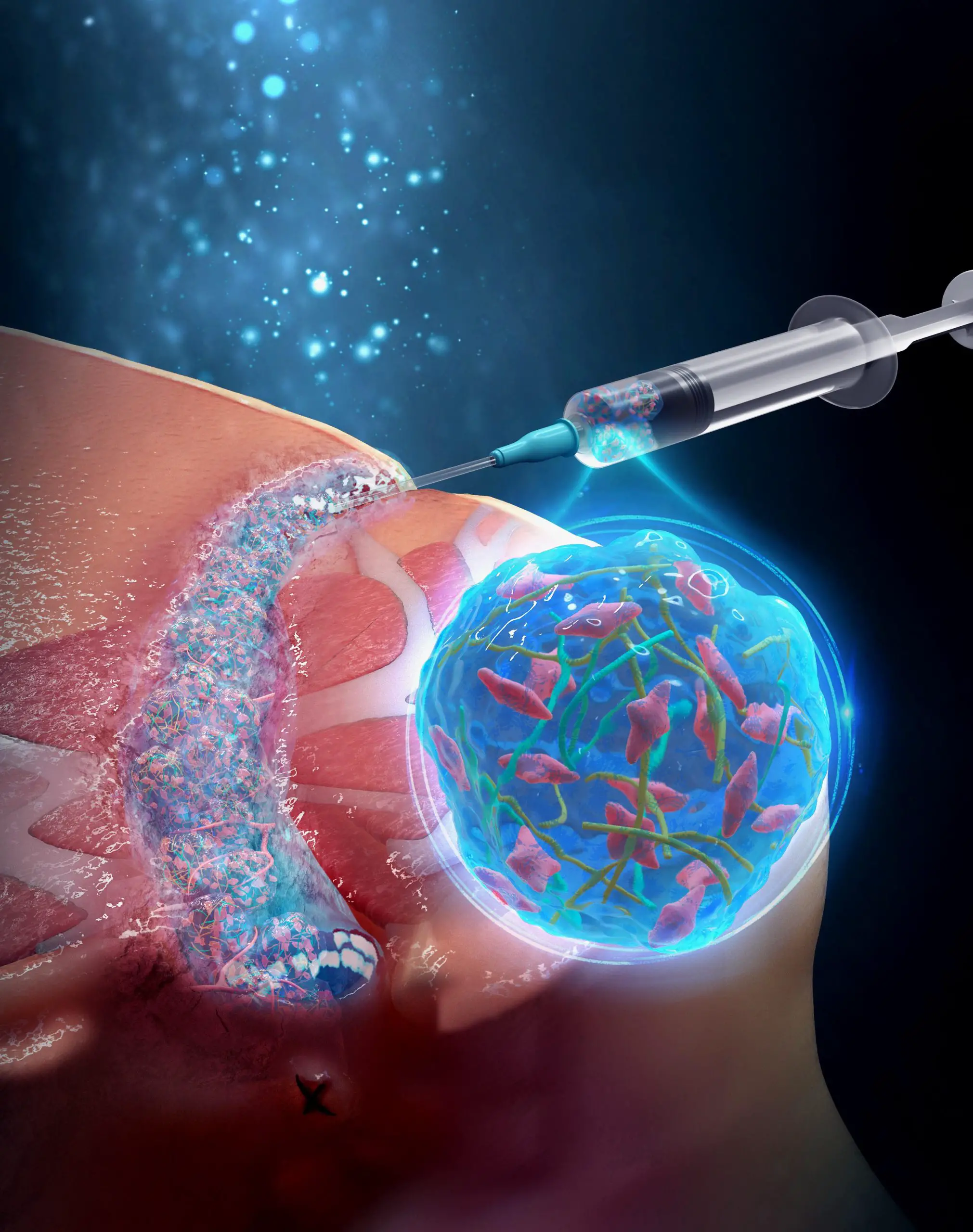Summary of Nanofiber-Hydrogel Shows Success Treating Severe Complication of Crohn’s Disease:
Researchers from Johns Hopkins Medicine and the Whiting School of Engineering have developed an injectable biomimetic hydrogel composite that promotes regenerative healing in an animal model of Crohn’s perianal fistulas. The biodegradable hydrogel composite loaded with stem cells, that can be injected inside the fistula tract, showed a higher degree of healing, reducing the size of fistulas six-fold, in comparison to surgery. The results are promising for the treatment of perianal fistulas (PAF), a common complication of Crohn’s disease, which affects over three million adults in America. The team plans to continue this work and to improve the gel and verify these very encouraging results in human trials.
*****
Injectable Nanofiber Hydrogel Composite Loaded With Stem Cells: A Potential Breakthrough for Crohn’s Perianal Fistulas Treatment
Crohn’s disease is a subtype of inflammatory bowel disease that affects over three million adults in America. This chronic disease can cause a wide range of complications. One of the most common complications of Crohn’s disease is perianal fistulas, affecting 30% to 40% of patients. Perianal fistulas are characterized by an inflamed tunnel between the skin and the inside of the anus, causing severe pain, discomfort, and leakage of blood or pus. While surgery is often necessary to treat this painful condition, more than half of the patients do not benefit from current treatments.
Fortunately, researchers from Johns Hopkins Medicine and the Whiting School of Engineering have developed a biodegradable hydrogel composite loaded with stem cells that may promote healing in an animal model of Crohn’s perianal fistulas. This innovative injectable biomimetic hydrogel composite aims to help patients suffering from chronic Crohn’s perianal fistulas reduce pain, discomfort, and other complications associated with this malady.
The Study: Injecting Stem Cells into Fistula Tracts
Previous studies and clinical trials showed promising results when they injected stem cells around fistula tracts. However, the stem cells have not been retained around the fistula track to allow for any significant healing. The stem cells are likely to migrate away from the fistula tract, making it difficult to promote any healthy healing.
The team at Johns Hopkins sought to retain the stem cells for a long time within the fistula tract by developing a hydrogel composite that can be injected directly into the site of surgery. The biodegradable, mechanically fragmented nanofiber-hydrogel composite (mfNHC) is infused with nanofiber fragments that give the composition enough stiffness to anchor the stem cells in place, preventing them from migrating away from the fistula tract. Clinicians hope that this innovation can assist with tissue regeneration and promote healthy healing.
A Promising Study for Innovating Crohn’s Perianal Fistulas Treatments
To test the efficacy of the biodegradable hydrogel composite, the researchers used a rat model to simulate Crohn’s perianal fistulas. The team injected the biodegradable hydrogel composite loaded with stem cells directly into the fistula tract.
The results showed a six-fold reduction in the size of the fistula track, indicating that the injectable biomimetic hydrogel composite can reduce the size of fistulas compared to surgery. This is a significant breakthrough for bio-stimulation tissue repair for chronic injuries, not just Crohn’s perianal fistulas.
Encouraging Results, But Still in the Experimental Phase
While the results are promising, further research needs to be conducted to verify the safety and efficacy of the biodegradable hydrogel composite in human trials. At this stage, the hydrogel composite is considered experimental. Clinicians, however, hope that future studies will improve the biodegradable hydrogel composite and explore the idea of a foam version to optimize clinical application.
Lead researcher Florin M. Selaru, M.D., emphasizes that these encouraging results need to be verified in subsequent studies involving human subjects. The experiments conducted so far lay the foundation for future studies that can expand the potential of this breakthrough technology in treating chronic injuries beyond Crohn’s perianal fistulas.
Conclusions
Crohn’s disease is a relatively prevalent disease that can cause several complications in patients. One of the most common complications of Crohn’s disease is perianal fistulas, which can significantly reduce the patient’s quality of life. While surgery is the current standard of care, more than half the patients do not benefit from current treatments. The development of an injectable biomimetic hydrogel composite loaded with stem cells is a promising breakthrough in treating chronic Crohn’s perianal fistulas. While the results of the current study are compelling, further research using human subjects is necessary to verify the safety and efficacy of the hydrogel composite. Nonetheless, it is an exciting prospect for both patients and clinicians who aim to improve the quality of life of patients with this debilitating condition.


Comments are closed